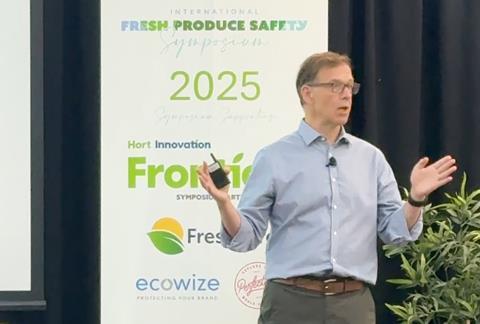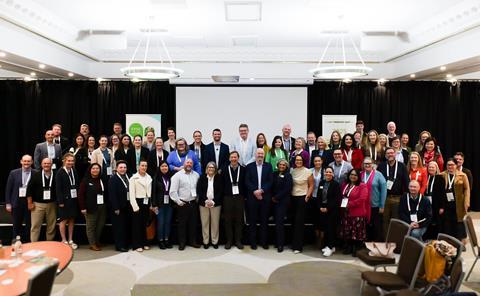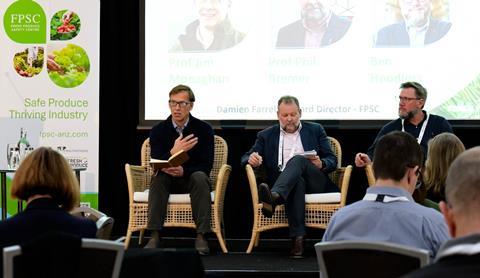The second edition of the International Fresh Produce Safety Symposium explored how industry can deliver safe product in an evolving food safety landscape.

The International Fresh Produce Safety Symposium (IFPSS) – organised by the Fresh Produce Safety Centre Australia & New Zealand – returned to Sydney on 28-30 July, bringing together a diverse group of speakers and delegates to discuss the future of food safety for the fresh fruit and vegetable industry.
The event began with a farm to lab tour, which took attendees on a guided visit of Barden Farms followed by a trip to the purpose-built food safety research facilities at the New South Wales Department of Primary Industries and Regional Development’s Central Coast Primary Industries Centre, Ourimbah.
This was followed by a two-day content programme following the theme ‘Innovate. Adapt. Secure.’ headlined by keynote speaker Jim Monaghan, director of the Centre for Crop & Environmental Science at Harper Adams University, UK.
Monaghan’s talk ‘Keeping It Clean – The Role of Risk Assessment for Fresh Produce Crops’ touched on the UK fresh produce industry’s approach to food safety and how it had responded to an E coli outbreak. He also detailed the importance of risk assessment in identifying and preventing contamination, particularly in potential hazards such as water sources.
“We need to keep crops clean, because once contamination is on, it’s really tough to get off. We need to use risk assessment to keep crops clean and we need to understand where our sources of contamination are coming from,” Monaghan said, noting key takeaways for industry.
“We need to understand the steps in which contamination events can occur and we need to put in place interventions to try and stop it.”
Monaghan said industry didn’t need to reinvent the wheel when it came to food safety standards but rather engage growers with practical, industry-led training.
Phil Bremer from the Department of Food Science, University of Otago took a broader look at the factors set to influence food safety in the coming years. He broke down the potential effects of trends, including climate change, packaging innovation, demographic change as well as highlighted emerging risks such as “forever chemicals”.
Day One of the programme also reflected on the Australian industry’s recent experience with an STEC recall, with industry bodies and regulators unpacking the response and identifying areas for improvement. Glen Neal, founder of Glen Neal Group and a previous member of Food Standards Australia New Zealand (FSANZ) talked to the importance of getting communication right during a food recall and the keys to conveying risk to consumers.
The day finished with a session updating the progress of the revised Guidelines for Fresh Produce Food Safety, which is now in its final phase.

Day Two began with a focus on assurance standards, with a session looking back and celebrating 25 years of Freshcare. Attention was turned to the future of certification, how the process can work better for industry and how the industry can better support the implementation of assurance standards.
Crucial to the ongoing success of the entire food safety framework is the role of auditors and quality assurance (QA) staff. A lack of younger staff entering the sector is a pressing issue, which surfaced in a number of sessions. On Day One a panel featuring quality managers from within industry explored what was required to attract the next generation, addressing barriers to entry, opportunities for experience and incentives. A session on Day Two highlighted the progress of food safety auditor intern programmes and examples of efforts from other industries to develop staff. A consistent message was the importance of cultivating and maintaining a strong food safety culture.
Another tool to address the food safety challenges of the future will be technology and ElementAG’s Ben Hoodless delivered a presentation on the role AI could play from the field to the lab. FreshChain Systems’ Greg Calvert spotlighted the power digital packaging and other digital tools have in fortifying the supply chain and supporting food safety responses.

Monaghan, Bremer and Hoodless joined together for the event’s final panel to summarise some of the learnings of the event.
Bremer noted that despite the food safety challenges the industry faces, the vast majority of produce is safe, but the industry can’t afford to rest on its laurels.
“Growers in Australia and New Zealand are in a fortunate position in that consumers believe that produce is inherently safe. But it’s important that growers don’t lose their trust because then it is a slippery slope,” said Bremer.
Hoodless said: “Risk starts in the field and there is a lot of opportunity to better understand how we can figure out what’s happening there and mitigate risks.”
Monaghan said food safety science and standards were already strong, but cooperation would be vital in the hunt for better outcomes.
“The standards are out there; the guidance is out there, but I think the elephant in the room is implementation. There’s going to be a bit of push and pull, but there has to be some cultural development that food safety is really important,” Monaghan said. “There are benefits to coming together and sharing what you learn.”
The Fresh Produce Safety Centre Australia & New Zealand has announced that the 2026 International Fresh Produce Safety Symposium will be at a new venue – the Novotel Sydney International Airport – with dates to be announced in the coming weeks.



